GYC 2025 “AI and Sustainability” Global Youth Essay & Speech Competition
GYC 2025 “AI and Sustainability” Global Youth Essay & Speech Competition Concludes Successfully
— Youth from 28 Countries Explore AI and a Sustainable Future
Ontario, Canada • March 26, 2025 – The sixth annual Global Youth Essay & Speech Competition, themed “AI and Sustainability”, officially concluded on March 22, 2025. Hosted by The Global Youth Challenge (GYC) and organized by The Erindale Academy in Toronto, Canada, this year’s event brought together outstanding young minds from 28 countries to explore the intersection of artificial intelligence and sustainable development, showcasing their critical thinking and communication skills.
The competition was held in a hybrid format, with the final round taking place on-site at The Erindale Academy in Toronto and livestreamed globally via YouTube and Bilibili. The event drew significant attention from audiences around the world.
Champions Emerge in Both Divisions
After an intense round of competition, Ella Mi from California, USA, was awarded the Senior Division Champion, while Mikael Sadek from Ottawa, Canada, claimed the title of Junior Division Champion.
Ella Mi’s speech focused on “How Artificial Intelligence Can Drive Clean Energy.” Drawing from her collaborative research with Stanford University, she analyzed the use of solar energy in California schools and employed machine learning models to examine how socioeconomic factors impact the adoption rate of photovoltaic systems. She highlighted the disparity in solar adoption between affluent and underprivileged communities and called for AI technologies to be leveraged as a powerful tool in promoting energy equity. Her innovative perspective, clear logic, and articulate delivery were highly praised by the judges.

Mikael Sadek, on the other hand, approached the topic from a different perspective by delving into the environmental impact of AI technologies themselves. He pointed out that while AI can optimize energy and resource allocation, its computational processes also consume massive amounts of electricity and water—for instance, ChatGPT alone reportedly uses up to 8.5 billion liters of water annually. Mikael proposed innovative solutions such as photonic chips and closed-loop cooling systems, advocating for a more sustainable path forward in AI development.
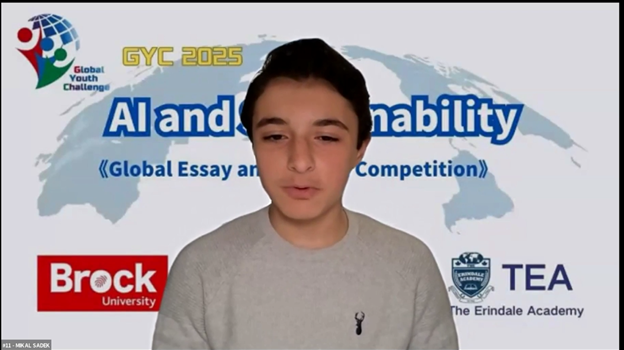
This year’s competition attracted over 1,000 youth participants from 20 countries around the world. Ultimately, 32 outstanding contestants advanced to the final round. Finalists delivered speeches on diverse topics including science, environment, economics, the arts, and business, and responded to live questions from the judges—showcasing the depth of thought and global vision of today’s youth.
The Top 16 Finalists in the Senior Division are:
Ella Mi, Fateme Bakhtiari, Shun Zhao, Loic Yu, Ivan Boyi Yu, Rainie Tang, Barry Lyndon Bunyamin, Chien Chi Han, Jia Yu Men, Jiajie Guo, Jihun Shin, Jimmy Yik Hei Liu, Mingying Li, Qiwen Liu, Quoc Thai Nguyen, Si U Chan.

The Top 16 Finalists in the Junior Division are:
Mikael Sadek, Mariam Chahrour, Thúy Hà Ngô, Amara Ganglani, Hawraa Hassoun, Ruofan Zhao, Yihao Niu, Thai Ngan Ha Nguyen, Yeeun Hwang, Tiana Jiaxin He, Yihong Niu, Oleksandr Mirzoian, Chi Io Ng.
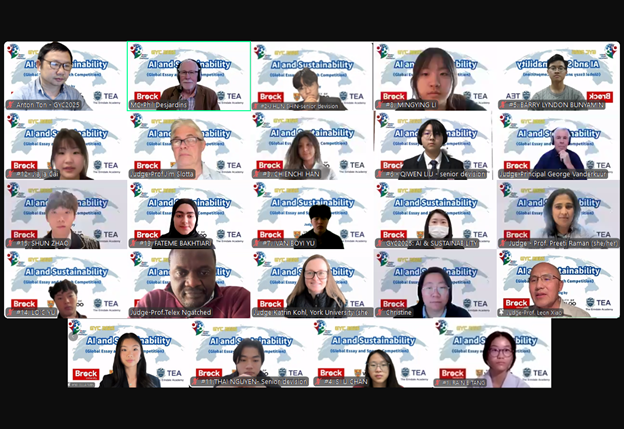
Distinguished Panel of Judges Lends Strong Support
This year’s competition was honored to have a panel of esteemed judges comprising experts from internationally renowned universities and educational institutions.
Senior Division Judges:
• Prof. Jim Slotta (University of Toronto)
• Prof. Katrin Kohl (UNESCO Chair in Education for Sustainable Development)
• Prof. Leon Xiao (Beijing Normal University)
• Principal George Vanderkuur (The Erindale Academy)
• Prof. Preeti Raman (Toronto Metropolitan University)
Junior Division Judges:
• Dr. Phil Laird (Vice President, Trinity Western University, Canada)
• Prof. Todd Green (Brock University)
• Anuli Ndubuisi (University of Toronto, Head of African Affairs)
• Zaynab Hussein (GYC 2024 Champion Representative)
• Prof. Howard Lin (Toronto Metropolitan University)
• Kelly Schultz (Development Manager, University of Waterloo)
The judges unanimously praised the contestants for demonstrating impressive global perspectives, logical thinking, and innovative spirit—truly representing the emerging leaders of tomorrow.
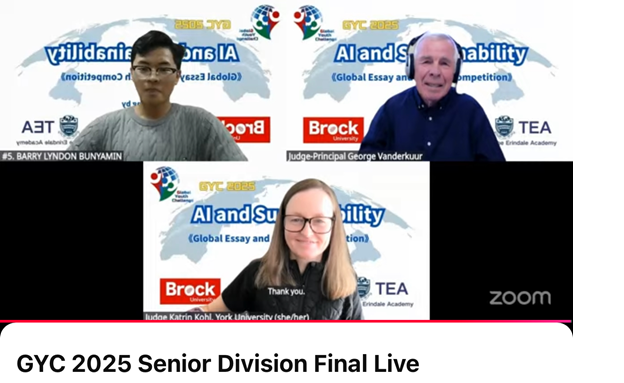
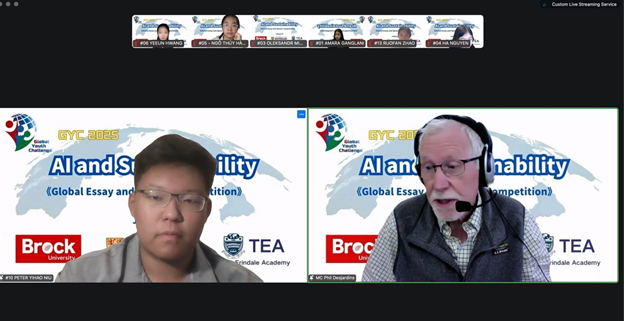
Collaborative Support to Build a Platform for the Future
Prof. Charles Hopkins, UNESCO Chair in Reorienting Education towards Sustainable Development, sent a letter of congratulations, highly commending GYC for its continued efforts in engaging global youth in issues of shared human concern.
All finalists received official certificates and cash awards from the organizing committee. The first prize winner was awarded CAD $500, while the second and third prize winners received CAD $200 and CAD $100, respectively.
Since the inception of the Global Youth Challenge, The Erindale Academy in Toronto, Canada, has provided unwavering support—ranging from event planning, resource allocation, and financial investment to volunteer services. The school has worked hand-in-hand with GYC to build a stage where young people from around the world can showcase their talents and pursue their dreams.
The GYC initiative has also received strong support from scholars and professors from leading institutions, including MIT, Harvard University, University of Toronto, University of Waterloo, Toronto Metropolitan University, Brock University, SUNY Binghamton, Texas Tech University, Beijing Normal University, Zhejiang University, and Huazhong University of Science and Technology, among others. These multidisciplinary experts have contributed as judges and advisors, ensuring the academic quality of the event and creating a globally connected platform for intellectual exchange among youth.
Looking Ahead: Inspiring Youth to Embrace Responsibility and Leadership
Paul Pu, Founder and Chair of the Global Youth Challenge (GYC), stated that the core mission of this competition is to inspire a sense of global responsibility and critical thinking among the younger generation, encouraging them to deeply reflect on the multifaceted impact of AI on the world.
He emphasized:
“We will continue to expand the reach of this competition and encourage more youth worldwide to actively participate—to explore how artificial intelligence can contribute to a more sustainable future for humanity. The future belongs to those young people who dare to think and have the courage to speak out.”
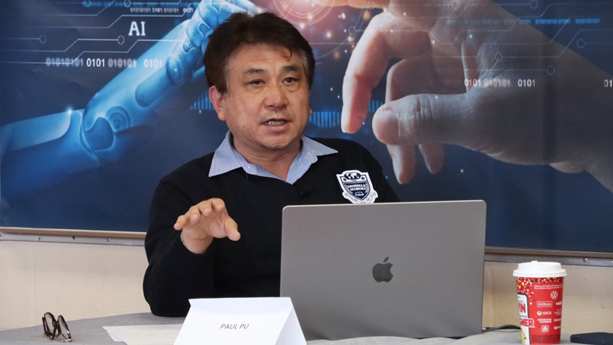
As a registered non-profit organization based in Toronto, Canada, the Global Youth Challenge (GYC) has been empowering young voices since its first successful event—the “COVID-19 Global Youth Essay & Speech Competition”—held in June 2020. Since then, GYC has organized annual competitions under the theme “Artificial Intelligence and the Future”, attracting over 8,000 youth participants from 28 countries worldwide.
With strong support from world-renowned universities and leading scholars, GYC is steadily growing into an internationally recognized platform for youth leadership development. We focus on global issues, listen to the voices of young people, and empower them to become responsible, visionary, and innovative leaders of tomorrow.
For more information, please visit the GYC official website: https://theglobalyouth.org/
